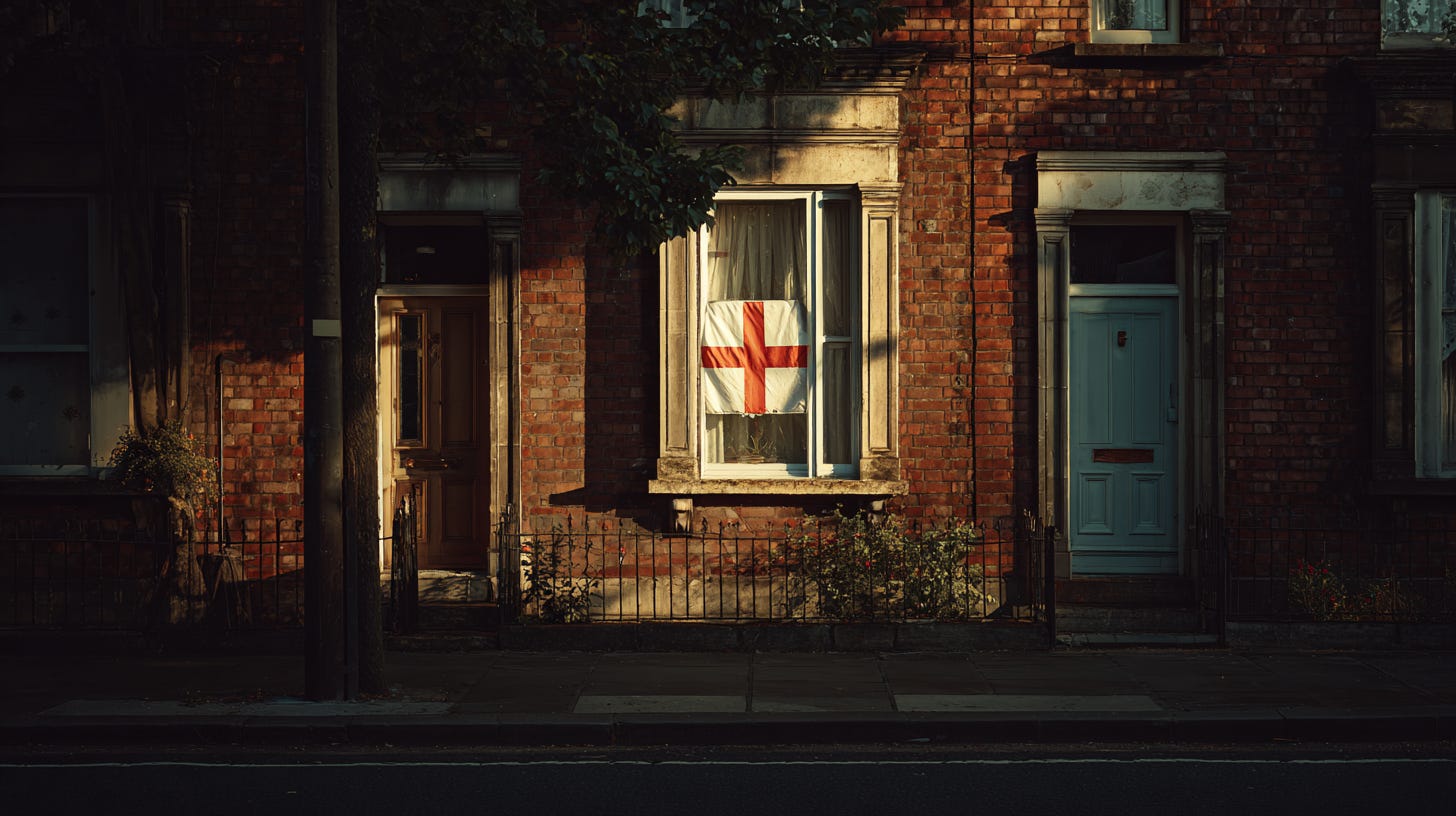It startled me at first.
The flat red cross of St. George hanging in a window, not as celebration but as warning. Not football. Not summer. Refugees.
I felt my stomach tighten. For years, that flag meant something lighter. Euro tournaments. Pubs spilling onto the pavement. A kind of rowdy togetherness, even if you weren’t much of a football fan. The flag was noisy, sometimes ridiculous, but never sinister.
Now it reads differently. Painted on the side of a van, draped across a window, it doesn’t feel like a cheer—it feels like a clenched fist. England isn’t for everyone.
I shouldn’t have been surprised.
I watched the same thing happen in America.
When I first relocated to the US, I proudly bought clothing with the stars and stripes on them. I wore them as a sign of pride in my new country. It felt simple then—a way of saying I belonged, that I was part of something larger than myself.
After 9/11, the flag was everywhere. At first, it felt unifying. Grief shared, resolve declared. But slowly, it shifted. The stars and stripes became a litmus test: are you with us or against us? Love of country reduced to a decal slapped on the back of a truck, used to sneer at anyone who questioned the wars that followed. Not patriotism—partisanship. Not belonging—boundary.
That’s when I learned how easily a symbol can be hollowed out and weaponized. And now I’m watching it happen again.
I’ve seen this playbook before.
Politicians rake in contracts, funnel money to friends, dodge taxes. Then, to cover their tracks, they hand us an easy scapegoat. They want us to believe it was the refugee in a dinghy who closed the ward, or the immigrant nurse who caused the waiting list. Easier stories than the truth—that austerity was deliberate, and the real theft was happening at the top.
It’s divide and rule, draped in bunting. And it works because fear doesn’t need nuance; it only needs a flag in a window.
The slogans do the heavy lifting. Stop the boats. Protect our borders. Simple words that promise safety but deliver distraction. Because while we’re shouting about who gets to cross a border, they’re quietly erasing the boundaries that should keep corruption in check.
And the flags keep waving.
Not for unity. Not for joy. But for fear.
Here’s what I know: symbols don’t belong to those who weaponize them. The English flag, the American flag—neither is the property of nationalists or grifters. They belong to everyone. To football fans and schoolchildren. To immigrants who choose this country and to refugees who need it. To anyone who believes a place can be better tomorrow than it was yesterday.
But when a flag shifts like this, it leaves a wound. I used to smile when I saw the St. George’s Cross fluttering on a car during the Euros. Now I glance away, as if eye contact might invite a confrontation. It’s a small thing, but it adds up: a shared symbol turned private warning, joy soured into suspicion. Losing that sense of belonging feels like losing a piece of myself I hadn’t realized was fragile. It’s like hearing a familiar song twisted into a chant you no longer want to join.
That’s the theft no one names. Not just of money or services, but of meaning. Of the simple pride of flying a flag without it being read as an act of hostility.
So the next time someone claims a flag as their weapon, remember this: the real betrayal isn’t a family fleeing war. It’s a politician hiding behind the banner, pocketing your future while pointing your anger elsewhere.
Once, I wore a flag as a sign of belonging. Now I ask: who gets to decide what it means?
Whose flag is it anyway?
That’s the question they don’t want you to ask.
Maybe the better question is: whose flag could it be, if we refused to give it away?



I hate what’s happening here. 😟
It was very unsettling to see that level of polarization. Sadly, I'm used to it in the US, but it took me by surprise to see it in so many places at home. 😞